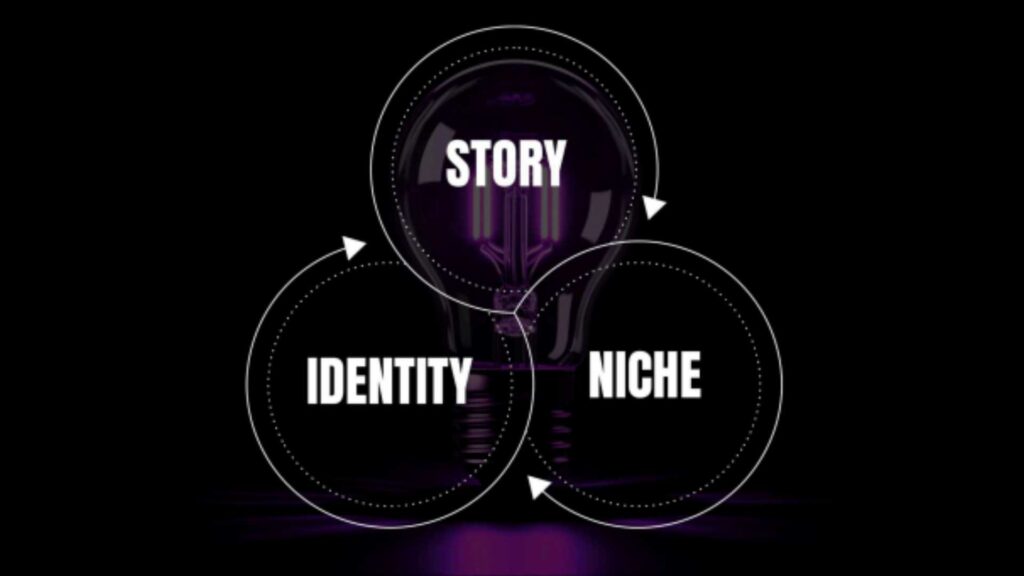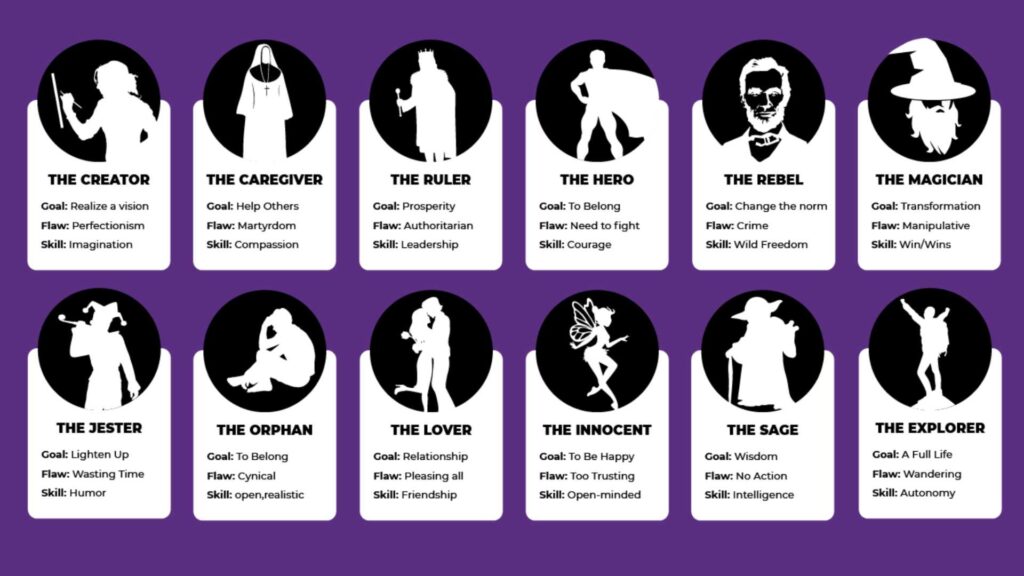
The Brand Revolution Begins Here
Imagine if a single shift in your approach could revolutionize your brand’s impact. That’s the power of
a meticulously crafted brand strategy. I’m Adrian Boysel, and over the last 17 years, I’ve mastered the
art of brand storytelling, transforming businesses into iconic brands.
In this article, I’ll share insights from my own playbook and reveal how a well-honed brand strategy
can elevate your business from the crowd. You’re not just building a brand; you’re igniting a legacy.
So let’s unravel the secrets to making your brand truly unforgettable.
On your journey of brand building, the foundation is your brand story. It’s more than a narrative; it’s
the soul of your brand, echoing through every product, service, campaign, and every customer
interaction.
It’s about forging an emotional connection with your audience overtime that creates what I call “Blind
Brand Loyalty”. My Purpose Driven Branding Blueprint does exactly that. We dive into the depths of
your brand’s story, exploring its ‘why’, ‘what’, and ‘how’, turning your brand into a living, breathing
entity.

If you are feeling invisible and want to bring your brand’s story to life, consider these three tips: First,
clearly articulate ‘Why’ your brand exists, focusing on the passion and purpose behind your business
idea. Next, define ‘What’ your brand offers, not just in terms of products or services, but in the value
and solutions provided to customers.
Lastly, delve into ‘How’ your brand delivers its promise. This involves outlining the unique processes,
techniques, or approaches that set your brand apart.
As we dive deeper into this article my goal is to take you on a journey and help you lay the foundation
for what will impact not just your own brand but the brands of your clients. I can attribute this process
and the success of my 5000+ past clients, whom I’ve helped generate over $100 Million for since
2007.
Next we are going to cover the “Niche” pillar of your brand, and then finally the Identity pillar. Once
you understand these pillars you will never be able to look at brand strategy or even marketing the
same way again. So let’s jump in and talk about your Niche.
Defining Your Brand’s Niche: Precision in Your Audience Targeting
So, you’ve crafted a compelling brand story, but what’s next? How do you ensure that your brand
doesn’t just speak, but resonates deeply with the right audience? This is where the art of defining
your niche comes into play. It’s about zeroing in on that specific market segment where your brand
doesn’t just serve, but truly connects and thrives.
Identifying your niche means understanding who your audience is, recognizing their needs, and
critically, pinpointing who they are not. This stage isn’t just about market analysis; it’s about carving
out your unique space in the vast expanse of the marketplace.

Who Your Audience Is: Begin by painting a detailed picture of your ideal customer. This is more than just demographics; it’s about understanding their lifestyle, preferences, challenges, and aspirations.
Consider factors like age, gender, income level, education, occupation, but also delve into their hobbies, values, and the social causes they care about. Creating detailed buyer personas at this stage will guide all your future marketing and branding efforts.
A helpful tip for you when it comes to nailing down your audience is the Digital Marketer Content Certification, it contains one of the best trainings on what they call the “Client Avatar Canvas”, I highly
recommend you learn that method as it goes in depth into the demographics, psychographics, wants,
needs, and fears.
Understanding and mapping out the before and after state of your dream customer is where most brands fall short, so make sure you don’t miss this critical step in the process.
Understanding Their Needs: Every successful brand addresses a specific need or desire in the market. What is the unique problem your brand solves? How does it improve your customers’ lives? Understanding these needs isn’t just about the practical aspects of your product or service but also about the emotional outcomes your customers are seeking.
I challenge you to go 7 layers deep into their tangible needs, not just surface level stuff like “Get more leads, get more traffic, or make more sales.”
Think about questions that will take them deeper into what’s driving their behaviors, is a lack of systems, understanding on how business works, or how to communicate in a way that makes people move towards the decision or outcome they want.
Defining Who They Are Not: Equally important is identifying who your audience is not. This helps in ensuring that your marketing efforts are not diluted and are laser-focused on those who will most likely engage with and benefit from your brand.
It’s about exclusion where necessary, to maintain the purity of your brand’s focus and message. Some of the most famous people, and brands would have become obsolete if not for creating content that repelled the type of people that you don’t want to work with.

One of the best examples of that is the brand Lion’s Not Sheep by Sean Whalen. He has been unapologetic in speaking about his political, philosophical, and spiritual, and societal beliefs.
His 7 figure a month clothing brand would not be what it is today if it had not made thousands if not
hundreds of thousands of people during the pandemic upset, Sean’s brand and business grew more from repelling people, getting them to tell people about it, than it did from attracting his dream customers, think about your opposition when you are planning your brand messaging strategy.
To effectively define your brand’s niche, consider these tips:
- Conduct Market Research: Utilize surveys, focus groups, and market analysis to gather data about your potential customers and their preferences.
- Analyze Competitors: Look at how competitors in your space define their audience. Identify gaps or areas they might be overlooking that your brand could capitalize on.
- Align with Your Brand Story: Ensure that your niche aligns seamlessly with your brand’s story and values. Your niche should feel like a natural extension of your brand narrative.
- Be Flexible: As your brand grows and evolves, be open to redefining or expanding your niche. Stay agile and attuned to market changes and customer feedback. Remember you’re in the business or serving others, being able to know what your market’s pains and challenges are is essential.
By clearly defining your niche, you lay the foundation for targeted and effective branding and marketing strategies. This clarity allows you to create messages, products, and experiences that speak directly to the heart of your audience, making your brand not just seen, but truly understood and appreciated.
Identifying Your Brand’s Archetype
A crucial aspect of crafting a resonant brand identity is identifying your brand’s archetype, it’s a practice I’ve used for nearly 5 years that has single handedly transformed my impact in the marketplace, providing more clarity, and consistency in my marketing messages.
Archetypes are universally recognized themes or characters that resonate deeply with human psychology. They provide a framework for your brand’s personality, shaping how it connects with your audience on an emotional level.

Your primary brand archetype is the main character your brand embodies. It could be the Caregiver, striving to nurture and protect; the Creator, driven to innovate; the Hero, overcoming challenges; or any other archetype that aligns with your brand’s core values and mission. This primary archetype sets the tone for your brand’s narrative, messaging, and interactions with your audience.
In addition to the primary archetype, consider a secondary archetype that complements and adds depth to your brand’s character. This secondary archetype supports and enriches the primary one, offering a more nuanced and multifaceted brand personality. For instance, a primary Creator archetype could be complemented by the Explorer, constantly seeking new ideas and inspiration.
To determine your brand’s archetypes, start by reflecting on your brand’s mission, values, and the emotional connections you wish to establish with your audience.
Consider the following:
- Assess Your Brand’s Core Values: What are the fundamental beliefs and principles that drive your brand? Align these with the traits of various archetypes to find a suitable match.
- Understand Your Audience’s Aspirations: What does your target audience aspire to or admire? Choose an archetype that embodies these aspirations to create a deeper connection.
- Analyze Your Brand’s Storytelling: Look at your brand’s storytelling style. Is it more adventurous, nurturing, rebellious, or wise? This can guide you toward a fitting archetype.
- Experiment with Combinations: Mix and match primary and secondary archetypes to find a combination that uniquely represents your brand while resonating with your audience.
- Consistency Across Touchpoints: Ensure that your chosen archetypes are consistently reflected across all brand touchpoints, from marketing materials to customer service.
Identifying your brand’s archetypes is not just about adopting a character; it’s about infusing your brand with a personality that captivates and connects. It’s a journey to discover the heart and soul of your brand’s story, creating a narrative that resonates with your audience on a profound level.
Through this process, you’ll craft a brand identity that’s not only memorable but also emotionally engaging, driving loyalty and affinity among your customers.
Your Mission Matters More Than You Realize
Let’s delve into the essence of your mission statement and the pivotal role it plays in your brand’s culture. Think of your mission statement as the pulsing heart of your brand – a succinct yet powerful proclamation of your brand’s purpose and direction. It’s not just a statement; it’s a rallying cry that unites your customers and team, fueling their passion and advocacy for the vision you’ve set forth.

The process of crafting this statement is more than mere wordplay; it’s a deep dive into the core of
your brand, capturing its aspirations and reason for being. A well-crafted mission statement is your brand’s guiding star, illuminating the path for every decision and action, ensuring they all lead back to what your brand truly stands for.
Start by reflecting on the core objectives of your brand. What change does your brand seek to create? What are its aspirations? This should not just be about the products or services but the broader impact your brand aims to have on its customers and the world.
Consider the emotional and inspirational elements of your brand. A mission statement should resonate emotionally with your audience, inspiring them to connect with your brand’s journey. It should be a beacon that guides every business decision and customer interaction.
Keep your mission statement clear and concise. It should be easily understandable, memorable, and powerful enough to evoke a sense of purpose both within your team and amongst your audience.
Steps for Crafting Your Mission Statement:
- Reflect on Your Brand’s Purpose: Delve deep into why your brand exists beyond making a profit. This could be about making a difference, solving a specific problem, or offering an exceptional experience.
- Incorporate Your Unique Value Proposition: Highlight what sets your brand apart. What unique benefits does your brand offer? How does it improve the lives of your customers?
- Seek Feedback: Once you draft your mission statement, get feedback from team members, trusted clients, or mentors. This can provide valuable insights and perspectives that might refine and strengthen your statement.
Solidifying Your Brand’s Identity: The Power of Core Values
Have you ever wondered what truly anchors a brand in the minds and hearts of its audience? It’s the core values. These foundational beliefs and guiding principles are more than just words on a page; they are the essence of your brand’s identity, shaping every interaction and decision.

Your brand’s core values act as the steadfast pillars supporting its mission, ensuring consistency and integrity in all aspects of your business, from internal culture to customer engagement.
These core values serve as a compass, guiding your brand’s journey and ensuring that every step taken aligns with the fundamental principles you stand for. They are the commitments that breathe life into your brand, making it relatable, trustworthy, and authentic in the eyes of your audience.
Define values that truly resonate with the essence of your brand. They should be more than just words; they should be commitments that are lived out in every aspect of your business, from internal culture to customer interactions.
Ensure that your core values are evident and consistent in all your brand’s touchpoints. This consistency fosters trust and credibility among your audience.
Steps for Defining Your Core Values:
- Identify Key Beliefs and Principles: Consider the beliefs and principles that are non-negotiable for your brand. These could range from quality and innovation to sustainability and community involvement.
- Reflect on Your Brand’s Personality and Culture: Your values should mirror the personality of your brand and the culture you want to cultivate within your organization.
- Involve Your Team: Include your team in the process of defining these values. This ensures a more comprehensive and inclusive perspective and fosters a stronger commitment to these values.
- Communicate and Demonstrate Your Values: Once defined, communicate your core values clearly to your audience. More importantly, demonstrate them through your actions, decisions, and how you run your business.
Bringing Your Brand’s Identity to Life
Your brand’s blueprint is a tapestry woven from your story, niche, and your identity. It’s a comprehensive narrative that defines who you are, what you stand for, and how you engage with the world.

Remember, your brand’s identity is dynamic, evolving as your business grows and the market changes. Regularly revisit and refine these elements to ensure they stay relevant and true to your brand’s journey.
As we conclude this journey, I invite you to delve deeper into the art of brand building. Join me in a comprehensive journey where we fine-tune these elements, crafting an identity that not only stands out but also resonates deeply with your audience.
‘A great brand is a story that never stops unfolding.’ -Adrian Boysel”
[TAG8]The post Unveiling the Secrets of Brand Mastery appeared first on DigitalMarketer.
Frequently Asked Questions
How can entrepreneurs motivate their employees.
Motivation can come in any form. It doesn't matter where it comes from, just make sure it motivates them to action. No matter what approach you choose, motivation is crucial for any business.
Employees who feel motivated are more likely to do well. For a team that performs well, provide them with the tools they need to feel empowered.
You need to create an environment where they feel valued. You need to create a place where they feel safe and respected. A place where they can freely share their ideas without fear of punishment.
A company culture that allows them to thrive and succeed. That's how you keep your best talent happy, loyal and productive.
To maintain a positive culture, you must reward the people who make it happen. You can offer bonuses for achieving goals, training opportunities, raises in pay, or other perks like health insurance.
You also need to provide clear direction and communication. Make sure everyone understands what is expected and why.
Your policies and procedures should be written down and communicated. Ensure that someone is responsible for ensuring they are followed.
Communication is key. Keep your employees informed about the current state of the organization. Let your team know about what's happening.
Communication is vital. Looking after your team is the best way for you to stay ahead of the game. They will take good care of you.
If you don't build a strong relationship with your employees, it could be costly. Studies have shown that companies with high employee engagement score higher in productivity and profitability than those struggling to retain their top performers.
It's important for employees to recognize that not everyone wants to work at a similar pace. Some people prefer to work alone, while others enjoy working in teams. Each person can be motivated in different ways, so it is up to you which one works for you.
One example is that some people respond better to recognition, while others may prefer incentives. Whatever works best for you and your company, it must be consistent with the company's objectives.
Ultimately, it's up to you as the leader to set the tone. Open-mindedness is key. Listen to your team. You have to listen to your team if you want it done right.
What are the advantages of an entrepreneurial mindset?
Being entrepreneurial has many benefits. The first is your ability to be self-reliant. You stop relying solely on other people.
You can be independent and pursue your dreams. It also helps you build relationships with other entrepreneurs because you share similar challenges and interests.
You gain confidence. Entrepreneurs are always learning new things. This allows you to be flexible and adapt quickly. Think outside the box to avoid getting stuck in a routine.
Everybody can start their business without being bound by any rules or regulations. We are free to choose what we do and how we live.
We have two options: follow the crowd, or fight it. You can choose to succeed or fail. We can choose to fail or win.
It's exhilarating to have freedom. You also have to take responsibility. You are responsible for everything that happens in your business once you take on this role.
You must be able to take risks if you want success. Don't be afraid to try new things. If you're willing to try to learn from your mistakes, you'll eventually reach your goal.
These are some of the lessons you should keep in mind when embarking on your journey.
Remember:
- Entrepreneurship can be a lifestyle choice.
- When you run your own business, you're the boss.
- Avoid following the latest trends.
- Success isn't measured in money but rather in freedom.
- Balance your personal and professional life.
- Set clear expectations.
- Always be sincere with your team.
- Remember, if you want something to happen, you've got to do something about it.
What makes an entrepreneur a success?
There are two types if entrepreneurs: those who make money or those who work part-time.
What makes them different is their approach to business. Money-makers focus on making more while time-makers focus on making more.
Those who make money are driven by the desire for financial freedom. Their goal is to be rich and remain rich.
They are motivated by fear, greed, and a sense of entitlement. They care little about the long term because they know that they will be set for life once they reach their goals.
This person is known as a hustler. They put the bottom line first and look for ways to increase revenues without sacrificing quality.
Some people have the ability to make it work. These entrepreneurs are passionate about their work. They are driven by passion to create something lasting and meaningful.
Their motivation is altruistic. They want to do great things. They care about making products and services that make a difference.
These people are often called dreamers. They are motivated by vision and inspiration. They are aware that success is hard work, persistence and dedication.
But the most important characteristic of these entrepreneurs is that they are creative. They are always looking for new opportunities.
They thrive in the unknown. They love to research new areas of interest and will often spend hours on it. Because they enjoy learning new things, they are always open for new ideas.
They are able to adapt to changes easily. They don't mind getting dirty or doing whatever it takes to win. They don't like mediocrity.
Which type of entrepreneur do you identify as? Are you driven to make it big or do you want to find meaning in life?
Congratulations to those who answered yes to both of these questions! You are a successful businessman.
I've had the pleasure of meeting many successful entrepreneurs over my career and one thing struck me was their passion.
Successful entrepreneurs aren't defined by monetary wealth alone. They are defined by the impact they make.
Steve Jobs, for instance, was well-known because of his charitable work but wasn't very wealthy. He was only in his mid-40s when he bought his first house.
His ability to create products that have changed the world was what gave him his wealth. And this is what makes him unique.
Your job is not to make wealth. It's not to build empires or amass power.
Your job is to build relationships with customers and partners. To build trust. To assist others in achieving their goals.
To make an impact. This is your legacy. This is your legacy, not your bank accounts.
We'd love to talk with you if we can help you build a lasting legacy.
Social Media University will show you how to make passive income online. How to market your business and make it grow automatically.
What is the importance of motivation for entrepreneurs?
When we feel lost or stuck, motivation is what propels us forward. It allows us to face our fears with courage and make tough decisions.
Motivation is also a driving force behind success. Lack of motivation can cause us to become lazy, unmotivated or unproductive, ultimately leading to our failure.
Motivation is the key to unlocking potential. This means finding a way to stay motivated throughout the day.
You can think about it like a muscle. The stronger it gets, the more you do it. It starts to weaken and atrophy if it isn’t exercised.
The most successful entrepreneurs are self motivated. They set goals, plan how they'll achieve them, then follow through.
There are times when you need to be motivated. These three steps will keep you motivated.
Step 1) Get inspired. Find someone whose example inspires you. Someone who is already achieving your goals.
Step 2. Establish small goals. Make sure each goal is achievable. Focus on the next step rather than the ultimate result. By breaking big goals down into smaller ones, you'll be able to reach them faster.
Step 3) Reward yourself. Reward yourself for achieving your goals. You don't need to get something in return; you could just be enjoying the time spent doing something.
Motivation is a choice. Choose to be happy and to succeed, and to live an abundant life.
Start today if you are ready to make a change in your life. The first step to making a change is to choose to do so. Next, take action. Get started now on your journey to living the life you desire.
What keeps you motivated as an entrepreneur
My biggest motivator is the freedom to do whatever I want to achieve my goals. The world we live in has limits on what people can save, earn, invest, buy and consume. These limits do not apply to us. We can pursue our dreams, and make them real.
We cannot allow ourselves to be enslaved with these limitations. If we do this, we lose sight that we are the masters and controllers of our destiny. We are the captains and crew of our ships. We are the architects of our lives.
My drive is to create wealth that surpasses my wildest imagination. To build businesses that transcend life. To create businesses that can change the way people live their lives forever.
To build stronger businesses than any government, to make them more influential than any religion and to last longer than time.
It's why I'm here. Entrepreneurs need to grow faster than others. That's why I work hard. Because when you succeed, everyone wins.
What are five key factors that motivate entrepreneurs?
Motivation is the key ingredient to success. Without it, there would be no success. We wouldn't exist without it.
Motivational psychology examines how motivation affects human behavior. Motivated people can do incredible things. However, motivation is not unlimited.
The five most important motivating factors are:
- Autonomy is the freedom to choose
- Mastery - the ability to master skills
- Purpose - The sense of purpose
- Relatedness - the feeling of belonging
- Reciprocity, the desire to give and receive
These motivators may be able to be applied to your company. You may feel that each of these motivators could be applied to your business. However, each offers a slightly unique perspective on why people act the same way.
An individual might want autonomy because he is able to make his own decisions. Or he might want to mastery because he wants more skill at his job.
You could go on. These are just some of the motivations that could be used. There are many more. However, which ones might be most applicable to your particular situation. This is entirely up to you.
In order to find out, I'd recommend writing down three words that describe your ideal work environment. Then take those same words and apply them to your current working conditions.
If you're having difficulty coming up with ideas then ask yourself, "Why do I do this?" You will find your goals when you know the answer.
Once you know your goals and objectives, you can determine where you stand now. That knowledge can help determine if you should change.
If you don’t wish to change anything, then it’s time to consider your options.
If you want to make changes, you need to think of ways to motivate you.
Which of these motivators is most effective? It's hard not to say. Instead of focusing your attention on one factor only, think about all five.
These will assist you in achieving your ultimate goal of becoming an entrepreneur.
Statistics
- Invest at least 30% managing those with authority over you and 15% managing your peers.” (americanexpress.com)
- According to analysts, Johnson has high appeal in all four quadrants tracked at the multiplex: male, female, over-25 and under-25. (forbes.com)
- “If you look to lead, invest at least 40% of your time managing yourself – your ethics, character, principles, purpose, motivation, and conduct. (americanexpress.com)
- "If you improve by just 1% every single day, in several months, you will have improved by 100%. (carolroth.com)
- “Effective communication is 20% what you know and 80% how you feel about what you know. (americanexpress.com)
External Links
[TAG18]
- How to get over your fear of failure - Due
- 7 Daily Habits That Make People Extremely Productive - Due
[TAG21]
- This inspiring quote Jeff Bezos keeps in his fridge
- Richard Branson is a billionaire. Here are my top ten tips for success
[TAG24]
[TAG27]
How To
What are 3 things that motivate entrepreneurs?
Entrepreneurs must have motivation. Motivation is essential for any entrepreneur. Without it, there's no motivation to succeed. But what motivates us?
We stay motivated for three reasons:
- We love our business
- Our vision/mission is greater than our own.
- We have a passion for helping others
You can stay motivated by finding ways to tap into those motivations. When we love our business we feel great pride when it succeeds. If we have a great vision, we feel more fulfilled knowing that our efforts are making a positive difference in the world. A strong desire to help others makes us feel fulfilled.
According to a University of Chicago study, the best way for you to motivate yourself is to be focused on the things that matter to you. His book, "Loneliness," states that "the best source for motivation is caring about someone." This will make us more engaged and motivated. It makes sense that when we care about something, we will be more passionate about doing it!
Did you miss our previous article...
https://consumernewsnetwork.com/technology-news/ai-anxiety-does-ai-detection-really-work






